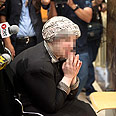
'Starving mother' accepts plea bargain
After doctors testimony on child's condition, mother accused of starving her son accepts plea bargain she earlier rejected on advice from rabbis
Plea bargain reached even after the last moment – in the corridors of the court. A woman accused of starving her son accepted a plea bargain on Thursday after evidence was presented at Jerusalem's Magistrate's Court, including testimony from the doctor who cared for the child.
Dr. Michael Weintraub described the terrible state to which the child had deteriorated, and it seems this may have prompted the renewed efforts to agree to a plea bargain she had previously rejected on advice from her rabbis.
According to the agreement, the mother will be under house arrest for three years, and kept away from the children for five years except under conditions to be determined for visiting. She is also expected to undergo medical treatment. After two years, if she meets the conditions of the plea bargain, she will be able to see her children in their house under observation for a few hours each day.

The senior doctor from Hadassah Mount Scopus Hospital in Jerusalem gave testimony for about an hour regarding the signs he had discovered in the boy H., who was three years old at the time, and the behavior of his mother, which he described as "violent acts."
Disease 'didn't exist'
When he was first brought to hospital, the child had undergone extensive checks to ascertain what was causing him so much suffering, when in fact doctors were seeking a disease that didn't exist.
Each time medical teams tried to feed H., Weintraub said, his mother would say that something was hurting him and that he shouldn't be fed. At this stage they still believed her, because nobody wanted to think that a mother would harm her child.
The doctor even demonstrated, using a doll, how the mother would disconnect the feeding tubes from the child, though only the medical team was authorized to do this. The boys' uncle, the doctor said, related that he had seen the mother's hands under the blanket and the boy screaming in pain. At this point it was decided to take the boy under medical supervision.
"We were concerned that the mother would decide to take him to another hospital, so we reported the incident," the doctor testified. "She strongly opposed and was furious that we moved the boy to a room closer to the nurses' station."

'When she was away, he slept soundly' (Photo: Moshe Moskovitz)
Weintraub emphasized that on the day the mother was kept away from the ward, the boy's skin condition disappeared, and his skin cleared up completely.
"When the mother wasn't around, the boy slept soundly and no morphine was required," he said. "When we kept her away from him, in less than a week we were able to stop the morphine completely, and the child got completely well and didn’t need any drugs."
Later, upon receiving further evidence, the possibility that he was suffering from his mother's acts was raised. It was also suspected that the mother suffered from Munchausen Syndrome by proxy, in which a parent causes marks of illness on the child.
The mother's legal defense tried to persuade her to accept the plea bargain, according to which she would admit to most of the paragraphs in the indictment and would thus avoid jail.
On Thursday morning, she was still refusing the agreement in accordance with instructions from her rabbis, but after the doctor's testimony the two sides requested a break in the proceedings because they were close to reaching a plea bargain.
It should be noted that the conditions for her detention and what access she should have to her children during the trial have already been extensively discussed. At the same time, the haredi population has held ongoing and sometimes violent protests against her arrest.
District Court Judge Moshe Ravid eventually ruled that the mother should be kept away from Mea Shearim, the ultra-Orthodox neighborhood in Jerusalem, together with her children – excluding H., who was the victim of her abuse – and that she would be held under house arrest with 24-hour surveillance.
All appeals by the prosecution against this ruling were rejected. The replacement of the mother's defense team also resulted in delays to the trial.
Plea bargain terms
According to the plea bargain, the mother will admit to abusing a helpless child, and the court's sentence will be handed down in three years' time.
Meanwhile, she and husband agree to declare their children minors in need of assistance. All the children will return to the family home except the baby just born and the child who was abused, and will live separately from their mother. The father will receive parental guidance and treatment through the welfare services, as much as they see necessary.
The abused child will remain with his uncle for nine months, after which the possibility of his return to his father will be assessed. The child too will receive treatment via the welfare services.
The mother will live with her mother, the children's grandmother, under full house arrest except for trips for psychological treatment. The grandmother will maintain observation on the baby's condition, and a pediatrician will follow developments. After a year and a half, the possibility of the mother seeing her children in her own house for a few hours each day will be assessed.
After three years, the prosecution will request a suspended prison sentence for a further two years. Any violation of the terms will grant the prosecution to turn to the court to bring forward the date of sentencing. In this case, the prosecution will request imprisonment.










